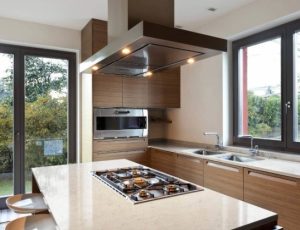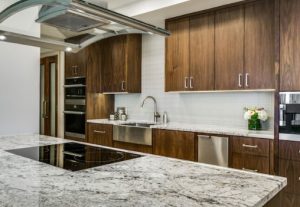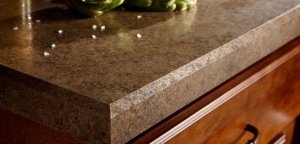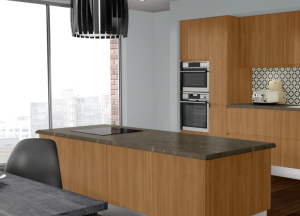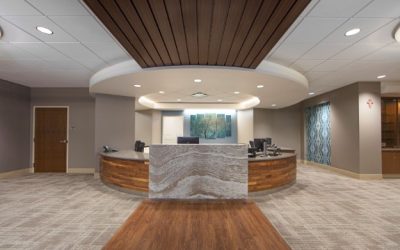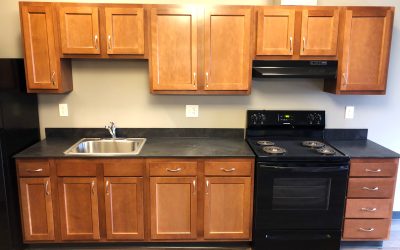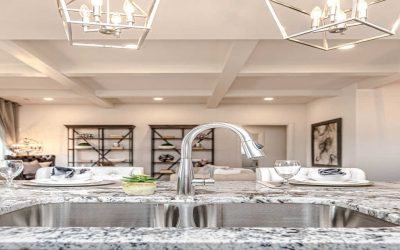When designing or renovating kitchens and bathrooms in multi-family residences, one of the most important decisions is selecting the right countertop material. The ideal countertop should balance aesthetics, durability, cost, and maintenance. With so many materials available, including quartz, granite, laminate, and Solid Surface, it’s important to understand the pros and cons of each option, their upkeep requirements, and the styles they best complement. Here’s a comprehensive guide to help select the best countertop material for your multi-family project.
1. Quartz Countertops
Pros:
• Non-Porous Surface: Quartz is non-porous, which makes it highly resistant to stains, bacteria, and moisture. No sealing is required, making maintenance easy.
• Durability: Quartz is one of the most durable materials on the market, resistant to scratches, chips, and cracks.
• Consistency: Unlike granite, quartz countertops have a more uniform appearance, which can be appealing for a clean and contemporary look.
Cons:
• Cost: Like granite, quartz can be expensive, though its durability and low maintenance requirements often justify the higher price.
• Heat Sensitivity: While quartz is heat-resistant, it’s not as tolerant of extreme temperatures as granite, so it’s important to avoid placing hot pans directly on the surface.
Best For:
Quartz countertops are ideal for modern or contemporary kitchens and bathrooms in multi-family homes. They work well in high-traffic areas because of their durability and ease of care, making them a popular choice for luxury apartments or condos.
2. Granite Countertops
Pros:
• Natural Beauty: Granite offers unique, one-of-a-kind patterns that enhance any kitchen or bathroom. No two slabs are exactly the same, making it a popular choice for high-end finishes.
• Durability: Granite is highly resistant to heat, scratches, and general wear, making it a great option for kitchens that see heavy use.
• Value: Installing granite can increase the overall value of a multi-family residence, making it a worthwhile investment for properties looking to attract higher-end tenants.
Cons:
• Cost: Granite is one of the more expensive countertop options, both in material and installation.
• Maintenance: Granite requires regular sealing to maintain its resistance to stains and bacteria. Without proper sealing, it can absorb liquids and develop stains over time.
Best For:
Granite countertops are best suited for upscale multi-family units where luxury and aesthetic appeal are key selling points. They complement traditional, modern, or rustic kitchen styles.
3. Laminate Countertops
Pros:
• Affordability: Laminate is one of the most cost-effective countertop materials available, making it a great option for budget-conscious properties.
• Variety: Laminate comes in a wide range of colors and patterns, including options that mimic the look of natural stone or wood.
• Easy Maintenance: Laminate is easy to clean and requires no special sealing or treatment.
Cons:
• Less Durable: Laminate is more prone to scratches, chips, and heat damage compared to other materials. It can wear down more quickly in high-use areas.
• Not Repairable: Unlike solid surface materials, laminate cannot be easily repaired if it gets damaged.
Best For:
Laminate countertops are an excellent choice for affordable housing units, student apartments, or any multi-family property where cost is a key concern. They complement casual, contemporary, or minimalist styles.
4. Solid Surface Countertops
Pros:
• Seamless Appearance: Solid Surface countertops are made from acrylic or polyester and can be fabricated with virtually no visible seams. This gives them a sleek, modern look.
• Repairable: Scratches, dents, or chips in Solid Surface countertops can be sanded out or repaired relatively easily.
• Low Maintenance: Solid Surface countertops are non-porous, making them resistant to bacteria and stains. They don’t require sealing like natural stone.
Cons:
• Susceptible to Heat: Solid Surface countertops can be damaged by high heat, so hot pots and pans should not be placed directly on the surface.
• Less Resilient Than Stone: While durable, Solid Surface materials aren’t as hard as quartz or granite and can be scratched or dented over time.
Best For:
Solid Surface countertops are well-suited for mid-range to high-end multi-family projects where a modern, seamless look is desired. They work well in contemporary or minimalist kitchens and bathrooms that prioritize sleek, clean lines.
Whether you’re upgrading or constructing a new kitchen or bathroom in a multi-family unit, the right countertop material can enhance both the look and functionality of the space. Be sure to weigh the pros and cons of each material to make an informed decision that meets the needs of the property and residents.
L.E. Smith also offers premium cabinets, countertops, vanities and more for new multi-family construction or renovation projects. As an all-in-one solution (link to pdf) for kitchens and baths, multi-family builders benefit from the ultimate in convenience, affordability, and project execution. Plus, our unique bundled cabinet and countertop offering includes on-time delivery, project management, and installation services when needed.
If you are interested in learning more about how The L.E. Smith Company can help you increase your profit margin, contact us at insidesales@lesmith.com or call 419-636-4555.

